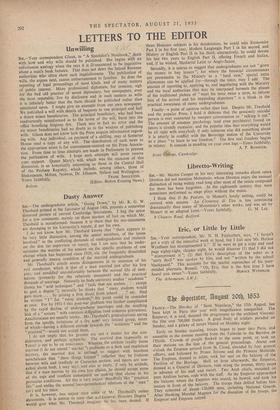LETTERS TO THE EDITOR
Unwilling
SIR,—Your correspondent Glaux, in " A Spectator's Notebook," deals with how and why wills should be published. She begins with an unfortunate analogy when she says it is ill-mannered to be inquisitive about a man's bank balance. That does not deter the Inland Revenue authorities who often show such inquisitiveness. The publication of wills, she argues next, causes embarrassment to families. So does the reporting of legal proceedings of most kinds, and of many matters of public interest. Many professional diplomats, for instance, sigh for the bad old practice of secret diplomacy, but newspapers, even the most reputable, live by disclosure and in such matters as wills it is infinitely better that the facts should be published rather than speculated upon. I might give an example from our own newspaper. We published a will with details of bequests to one principal and half a dozen minor beneficiaries. The principal beneficiary, who had been inadvertently misinformed as to the terms of the will, burst into the office breathing litigious fire. There was in fact no error and the six minor beneficiaries had no doubt as to the wisdom of publishing wills. Glaux does not know how the Press acquire information regard- ing wills. Any individual, on payment of a shilling, may at Somerset House read a copy of any will. The distribution of such news to the appropriate areas is for convenience centred on the Press Associa- tion. From time to time attempts are made in Parliament to prevent the publication of wills. I hope such attempts will never receive your support. Queen Mary's will, which was the occasion of this discussion, is as historically interesting as those in the Central Hall of the Probate Registry, which include, among others, those of Shakespeare, Milton, Newton, Dr. Janson, Nelson and Wellington.— Yours faithfully, FRANK SINGLETON.


























 Previous page
Previous page